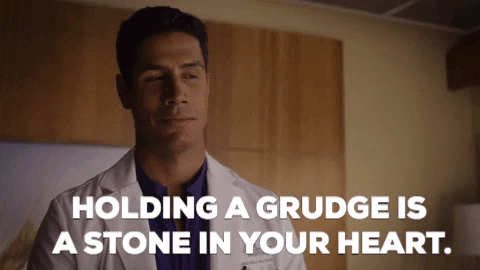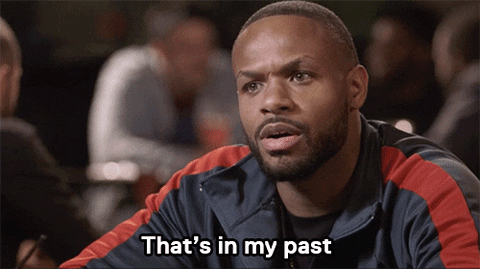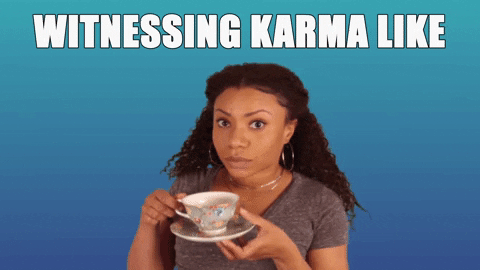
Yeah. I'll be the first to raise my hand in this class and say that forgiveness is a process. What I mean by that is, whether you choose to forgive someone while looking them dead in the eye, while journaling at home or while standing at the foot of an altar, rarely do you say the words, "I forgive you" and, immediately following, everything is fully resolved. Or healed. When you decide to forgive someone via your words, it is basically like making a public declaration that you are going to put yourself on the path to, as the dictionary definitions of the word state— "to grant pardon for or remission of (an offense, debt, etc.)"; "to cease to feel resentment against and absolve (to cancel an indebtedness or liability of", or "to set free or release, as from some duty, obligation, or responsibility)".
Pardon. Not resent. Release. Hmph. No wonder so many mental health professionals say that when we choose to forgive a person, it's far more for our benefit than it is for theirs; that to choose (because it is always a choice) to hold onto the fallout of our experiences is holding us back, stressing us out and, according to many reports, even making us sick. No joke. There are studies that reveal unforgivingness can keep you in a state of anger and raise your blood pressure. Unforgivingness can also increase levels of depression and PTSD. Shoot, unforgivingness can even cut your lifespan short. And really, y'all, is holding a grudge really worth all of that?
That's why I wanted to take out a few minutes of your time to first say, if you know there is someone you need to forgive, for your own health and well-being, please consider doing so. And second, if you're reading this and you someone who hurt you, offended you and/or totally pissed you off immediately comes to mind, just to make sure that you're as free from the situation as you may believe that you are. You can do this by going down this checklist of signs that a person isn't as good at forgiving as they might think that they are.
Why Is Forgiving So Hard to Do?

Since most of us know that bestowing forgiveness is essential in life (because none of us is perfect, right?), why is it that so many of us seem to struggle so much with forgiving others? In a good article that I read on the topic, the author brought up three good points. A lot of us don't forgive others because 1) we don't want the "offender" to think that what they did was OK; 2) we don't think that the person who hurt us deserves forgiveness, and/or 3) we don't trust them. Thanks to my own forgiveness journey, what I have learned is, far too often we are hesitant or even afraid to forgive someone because we think that forgiveness and reconciliation are one in the same, when that is not even remotely the case.
You forgive as a way to heal from the hurt or harm that was done to you. You also forgive in order to release yourself from the temptation to keep the cycle of pain going by hurting or harming the other person (or someone else because you are still holding onto unforgivingness).
Reconciliation is another matter entirely. If it is even on the table for discussion, the offender has some work to do in order to restore what has been lost (and if they are truly sorry, they are all for putting the sweat equity in with their words and actions—no question about that). So no, never feel that just because you have forgiven someone that you are invalidating your feelings about the offense or that you have to have the same kind of relationship with them moving forward. Forgiveness isn't designed to make you more vulnerable; it's actually meant to empower you by helping you to let the pain, fear and frustration go.
Now, with all of this out of the way, here are some pretty telling signs that you're not as good at forgiving as you probably need to be.
1. You Don’t Really Ever Let Things Go

Something that I deal with a lot in marriage counseling are people who forgive with their mouths but not necessarily via their actions. What I mean by that is, although one spouse will claim that they've forgiven their partner for something that they've done, the moment they do something else that they don't like, the past issue comes up. It's almost like they hold onto it like a trump card to use in an argument in order to "win" it. Nothing healthy comes out of it because really, who wants to constantly hear about their past missteps and mishaps all of the time?
Say that you are married, your husband misspends some money and it caused a check to bounce. You talk it through and then tell yourself and him that you are willing to let it go. But then he forgets to pay a different bill five months later and you bring his misspending from before up, even though these are the only times in recent history that it has happened. This is a good example of not being able to let things go.
If your man really isn't the best with money, perhaps it's time for you to handle the finances or for you guys to get a financial consultant. But to berate him every time he does something, even though you claim you've forgiven him, means that you actually didn't. Not only that, but the more that you "stockpile" his mistakes, the harder it will be to get past a challenge or problem the next time one comes up.
Interestingly enough, this is one of the reasons why a lot of couples end up divorcing after 20 years of marriage; they never really forgave each other for much of…anything really. And you know what they say—eventually a collection of snowflakes end up turning into a huge avalanche.
2. You Take “Forgive but Don’t Forget” Totally Out of Context

One time, I heard a guy named Cedric Dent say something about forgiveness that I think is pretty good. He used the hypothetical example of him telling someone something in confidence, them turning around and telling other people, and then them ultimately asking for forgiveness for the betrayal. According to Cedric, the best way to handle an instance like that is to forgive the person, but to also not tell them any more secrets for a while. It's not because you are holding things over them; it's actually their actions have shown that they have a weakness when it comes to respecting someone else's privacy.
I think this is the healthy way of applying the old adage "forgive but don't forget". You're not "not forgetting the offense" in order to weaponize the offender with it later up the road. You're using it as a teachable moment so that you can do all that you can to prevent being in a similar situation again. It's not about holding something over a person; it's about making sure that you apply wisdom in the future. No more, no less.
That said, forgiving while not forgetting shouldn't be about not being open to giving someone another chance. It's simply about asking yourself, "What did I learn from this experience?" and then applying it across the board. For instance, if someone revealed one of your secrets, what's the lesson? Perhaps it's something as simple as learning how to vet people better in the future. "Not forgetting" should be more about how the situation can make you better rather than how to make someone feel like they cannot be redeemed for what they have done. If you've truly forgiven them, sometimes they can be—once trust has been restored. It's close to impossible for that to happen if you're holding onto the out of context take of "forgive but don't forget".
3. You Lack Empathy in the Forgiving Process

I remember when I got my first abortion and a "friend" that I went to school with, who was a virgin at the time, told me that I was going to go to hell for it. Fast forward to her having a late period two years later and—surprise, surprise—she was asking me what clinic I went to for my procedure.
Yeah, it can be really easy to think that someone is not worthy of your forgiveness—or forgiveness, in general—when you haven't done anything similar to what they did to you (or you have selective memory when it comes to some of the past things that you have done). But we've all done something that some human, somewhere, would deem "unforgivable". Not only that but, if a lot of us were truly honest with ourselves, the reason why we don't extend the forgiveness is because, on some cryptic level, we want to have some sort of power over the person who offended us.
I can speak from very up close and personal experience that the sooner you bring empathy—" the power of understanding and imaginatively entering into another person's feelings"—into play, the sooner your heart will soften to a situation; any situation, really. Try it.
4. You’re Stuck in the Past

An author by the name of Criss Jami once said, "Grudges are for those who insist that they are owed something; forgiveness, however, is for those who are substantial enough to move on." Now put a pin in that as we touch on the main points from the article, "8 Signs You Have NOT Forgiven Someone", the author shares some of the following points.
Here's how to tell if you still need to do more forgiveness work. When you:
- Use what the person said or did as a topic of conversation.
- Daydream about getting revenge or some kind of justice. A good example of this is attending your high school reunion and showing them.
- Preoccupy your mind day in and day out either reliving or dwelling on the situation or the person's behaviors.
- Get annoyed if someone even mentions the person.
- Have a tendency to avoid the person.
- Are secretly delighted to hear about the person's current difficulties and losses.
- Strongly believe you have been unfairly treated and are an innocent victim.
- Have friends and family that are tired of talking about the person and the latest drama.
In another article on forgiveness, the author said this:
"…forgiveness brings the forgiver peace of mind and frees him or her from corrosive anger. While there is some debate over whether true forgiveness requires positive feelings toward the offender, experts agree that it at least involves letting go of deeply held negative feelings. In that way, it empowers you to recognize the pain you suffered without letting that pain define you, enabling you to heal and move on with your life."
Something that a lot of us refuse to acknowledge or accept about forgiveness is that it can keep us mentally, emotionally and relationally stagnant. Here's an example. Back when I was dating my late fiancé, it took for-e-ver to let him fully into my heart and life because my first love had done so much emotional damage. Looking back, I stand amazed by how much my fiancé was able to tolerate me bringing up my ex or sometimes even comparing the two of them. By the time I finally did let my guard down, Damien (my fiancé) died just a few months later.
That's the thing about unforgivingness. In order to remain in that head and heart space, you have to keep thinking and looking backwards. And that is what can prevent you from truly moving forward. Hmph. The real "ouch" about that is while you're still stuck in your past, there's a pretty good chance that your offender…isn't. They are moving right along.
5. You Think That Karma Is YOUR Job

If you hop on Google, put "karma quotes" in the search field and then click on the "images" tab, you'll see a slew of karma references. Two that cracked me up were "Karma's just sharpening her nails and finishing her drink. She'll be with you shortly" and "In the end, karma will be a bigger bitch than I'll ever need to be". Two that had me like "hmm" were "Karma isn't a bitch, it's a mirror" and "You will never understand the damage you did to someone until it's done to you; that's why I'm here. Signed, Karma." But the quote that all of us should keep in mind as it relates to forgiveness is the one by Dr. Wayne Dyer—"How people treat you is their karma. How you react is yours." (Louder for the seats in the back, please.)
Although most of us consider karma to be "what goes around comes around", did you know that another definition of the word is "destiny" or "fate"? I can personally attest to the fact that karma has a way of handling what someone has done (ourselves included) in a way that we couldn't even begin to come up with on our own. Plus, when we let karma do its thing without trying to help it along, we avoid reaping seeds of bitterness, resentment and revenge.
Along these same lines, the Bible tells us that we reap what we sow (Galatians 6:6-10). What's really a trip about that Scripture is it doesn't put an expiration date on when that reaping will happen. The warning here is that you only waste time and bring unnecessary drama into your own life if you think it's better to be the "karma bestower" rather than forgiving someone. What's really crazy is, by trying to do karma's job, you keep the vicious cycle going—and usually end up doing further harm to yourself. (Something that unforgiveness knows will happen, by the way.)
Bonus: If You’re a Christian, You Don’t Factor in Just How Much You Need to Forgive

If you're a Christian (or you're simply someone who tries to apply biblical Scripture to your life as much as possible), I think it's imperative that I end this article on forgiveness on a particular note. Matthew 6:14-15(NKJV) tells us, "For if you forgive men their trespasses, your heavenly Father will also forgive you. But if you do not forgive men their trespasses, neither will your Father forgive your trespasses."
What this basically means that in order to be forgiven by God, we need to forgive those around us. It's a Scripture that actually keeps me pretty humble because it reminds me that just like I need to forgive others for what they've done, there is stuff that I do that I need to be forgiven by the Most High for; that nothing should keep me from wanting to live a free and forgiven life so that, at the very least, I can spiritually thrive as an individual.
True forgiveness ain't easy. Not by a long shot. But if you really want to evolve and heal as an individual, it's important that you do it. Not the "bad way" (you know, saying that you do even if you don't really mean it); the right way. Hopefully this article helped to point you in the direction of just that.
Forgive. So that your karma will bring forgiveness unto you. Amen. So be it, sis.
Want more stories like this? Sign up for our newsletter here and check out the related reads below:
How I Learned To Forgive People In My Life That Weren't Sorry
Jada Pinkett Smith Reminds Us Forgiveness Isn't About The Other Person
Why I Don't "Cut People Off" Anymore, I Release Them Instead
Feature image by Shutterstock
- When Forgiving Yourself Is the Hardest Kind of Forgiveness ... ›
- Can You Ever Forgive Me? review – horribly hilarious odd-couple ... ›
- Read This If There's Someone You Can't Forgive | Thought Catalog ›
- 5 Ways to Help Yourself Get Over a Big Mistake | Inc.com ›
- How to Forgive Someone Who Has Wronged You ›
- How Do You Forgive Even When It Feels Impossible? (Part 1 ... ›
- How To Forgive Someone Who Has Hurt You: In 15 Steps ›
- Why You Don't Always Have to Forgive | Psychology Today ›
This Is How To Keep 'Holiday Season Stress' From Infecting Your Relationship
Hmph. Maybe it’s just me, but it seems like there is something really weird happening in the fall season air (because winter doesn’t officially begin until December 21) that cuddle season is in full swing while break-up season is as well. In fact, did you know that break-ups are so popular during the holiday season that December 11 is deemed Break-Up Day?
The reasons why relationships shift around this time vary; however, I did both roll my eyes and chuckle when I read that a very popular one is because it’s an easy way to get out of getting one’s significant other a Christmas present. SMDH.
Anyway, I personally think that the less shallow folks out here may contemplate calling things “quits” or they at least distance themselves a bit from their partner (and what I’m referring to is serious relationships) due to all of the stress and strain that oftentimes comes with the holidays whether it be financial, familial, due to their tight schedules or something else.
Listen, I would hate for you and your man to miss the fun and happiness of experiencing this time of year, all because you are so overwhelmed or irritated that you can’t really enjoy it. That’s why I have a few practical tips for how to avoid allowing the typical holiday season stress from INFECTING your relationship.
Manage Your Expectations
 Giphy
GiphyUnmanaged expectations. If there is a main reason why the holiday season tends to be so stress-filled for so many people, I’d bet good money that this is the cause. And when you’re in a long-term relationship, expectations can manifest themselves in all sorts of cryptic and/or unexpected ways. You might have relatives who assume that you are going to be with them for Thanksgiving or Christmas when you have other plans in mind. You might be thinking that you are going to spend one amount for presents while your man is thinking something totally different. When it comes to scheduling, your signals may be crossed.
And you know what? To all of these scenarios, this is where clear and consistent communication come in. Don’t assume anything. Don’t dictate anything either. From now until New Year’s, mutually decide to check in once a week, just to make sure that you are both on the same page as it relates to the holidays and what you both are thinking will come along with it. The less blindsided you both feel, the less stressed out you will be. Trust me on this.
Set (and Keep) a Budget
 Giphy
GiphyOkay, so I read that last year, 36 percent of Americans incurred some type of holiday-related debt. Hmph. Last year, there was still some sense of normalcy in this country, chile, so I can only imagine what finances are gonna look like over the next several weeks. That said, since I don’t know a lot of people who don’t find being broke stressful, make sure that you and your bae set a budget and then stick to it this year — no ifs, ands or buts.
Because really, y’all — it doesn’t make sense to deplete savings and/or max out credit cards for a few days of giggles only to be damn near losing your mind because you don’t know how to make ends meet come Dr. Martin Luther King, Jr. Day.
And by the way, this tip doesn’t just speak to things like food and gifts; I also mean travel. If it doesn’t make a ton of sense (or cents) to be all over the place this year — DON’T BE.
Keep Matthew 5:37 at the Forefront
 Giphy
GiphyIf off the top of your head, you don’t know what Matthew 5:37 says, no worries, here ya go: “But let your ‘Yes’ be ‘Yes,’ and your ‘No,’ ‘No.’ For whatever is more than these is from the evil one.” That verse right there? Oh, it’s a boundaries lifesaver! I say that because do you see “maybe” or “I’ll think about it” in there? Nope. LOL. It says that you should tell people “yes” or “no” and leave it at that — and that complements Anne Lamott’s quote, “’No’ is a complete sentence” impeccably well. Yeah, you’ve got to remember that anything beyond a yes or no to a request is privileged information; you don’t owe anyone details or an explanation.
Besides, if you are really honest with yourself, when someone asks you something and you give a “Umm, let me think about it” kind of reply, more times than not, you already know what your answer is going to be — so why not let you both off of the hook? Give your response. Commit to that. And let everyone (including yourself) get on with their lives and schedules.
I promise you that when it comes to those holiday parties, you are pissing more folks off by not RSVP’ing or doing so and not showing up than just saying, “Thank you but not this year” off the rip.
Remember That Your Personal Space Is Privilege Not a Right
 Giphy
GiphyA friend of mine recently bought a new house and invited me over to come see it. He’s a single man with no children, so as I was taking in all of the space that he had, especially as I walked through his finished basement, I joked about relatives coming to live with him. “Hell no” and “absolutely not” were pretty much his immediate responses as he went on to say that some folks even had the nerve to be offended when he told them that he had no intentions on taking DNA in.
Ain’t it wild how people think that your stuff is their right? And yes, that brings me to my next point. Your home is your sanctuary space. If you want to host folks this year — cool. If not, ALSO COOL. Please don’t let folks (family included) guilt you into how they want you to act or even into what they would do if the shoe was on the other foot. You are not them — and as one of my favorite quotes states, “If two people were exactly alike, one of them would be unnecessary.” (A man by the name Larry Dixon said that.)
Hell, my friends? They know that I am good for sending them random things that they need or even want all throughout the year. Coming over to hang out at my pace, though. Uh-uh. Chalk it up to being a card-carrying member of the ambivert club yet I like keeping my living space personal — and I sleep like a baby, each and every night, for feeling that way.
Always remember that your space, your time, your resources, your energy and shoot, yourself period (including your relationship), are all things that are your own. You get to choose how, when and why you want to share them. The holiday season is certainly no exception.
Cultivate Some “You Two Only” Traditions
 Giphy
GiphyIt’s not uncommon for some couples to hit me up after the holiday season to “detox.” Sometimes it’s due to the financial drama (and sometimes trauma) that they experienced. Sometimes it’s because they allowed their relatives (especially in-laws) to get more into their personal business than they should’ve. More than anything, though, it tends to be because they didn’t get enough quality time together and so ended up feeling “disconnected.”
Please don’t let that happen. Listen, I’m not even a holidays kind of woman and yet, I will absolutely sit myself down with some hot chocolate and chocolate chip cookies to enjoy a Hallmark holiday film or two. Aside from the fact that most of them are lighthearted and sweet, I also like that they usually focus on couples loving on each other amidst all of the holiday beauty and ambiance — which is something that all couples should set aside some time to do.
Maybe it’s a vacation. Maybe it’s a staycation. Or maybe it’s my personal favorite, A SEXCATION. Whether it’s for a few days, the weekend or even overnight — don’t you let the holidays go by without setting aside time for you and your man to celebrate one another. Don’t you dare (check out “Are You Ready To Have Some Very Merry 'Christmas Sex'?”).
GET. SOME. REST.
 Giphy
GiphyI once read that 8 out of 10 people get stressed out over the holidays and 3 out of 10 lose sleep during to it — and when you’re stress-filled and sleep-deprived, that can absolutely lead to hypersensitivity, making mountains out of molehills and even not being in the mood for sex.
Your relationship can’t afford to go through any of this, so definitely make sure to prioritize rest. I don’t care how unrealistic it might seem during this time, sleep should never be seen as a luxury; it will always and forever be a great necessity.
That said, try to get no less than six hours of shut-eye in (check out “6 Fascinating Ways Sex And Sleep Definitely Go Hand In Hand”) and even ask your bae to take a nap with you sometimes (check out “Wanna Have Some Next-Level Sex? Take A Nap, Sis.”). Not only will sleep help to restore your mind, body and spirit but, when it’s with your partner, it’s an act of intimacy that can make you both feel super connected, even in the midst of what might feel like chaos.
___
Holiday season stress is real. Still, never give it the permission or power to throw your relationship off. Put you and your man first and let the holidays be what they are gonna be, chile.
Let’s make things inbox official! Sign up for the xoNecole newsletter for love, wellness, career, and exclusive content delivered straight to your inbox.
Featured image by Shutterstock
How To Avoid Being An Emotionally Impulsive Spender This Holiday Season
Geeze. Can you believe that we are just a few days out from another Christmas? Yeah, me neither. In fact, because I’m not a holidays person myself (check out “So, What If You Don't Observe Holidays?”), it wasn’t until one of my clients was venting about how stressed out she was due to all of the holiday season procrastinating that she had been doing that I realized just how fast December is actually flying by.
If, like her, you’re feeling frazzled because, although you told yourself last year that you weren’t going to wait until the last minute to “handle your business,” you ended up doing exactly that, fret not. I’ve got 10 tips that can keep you from making emotionally-triggered decisions as far as your financial expenses are concerned. Merry Christmas. #wink
1. Create a Budget. Stick to It.
 Giphy
GiphyBudgets, boy. I recently read that one of the reasons why they don’t work for a lot of people is because many folks don’t have a clue about how much money they spend on a monthly basis to begin with. SMDH. That said, at the end of the day, it’s important to remember that a budget is simply setting boundaries/limits on your spending — and being intentional about moving in this fashion is always a wise move; especially when it comes to this time of the year…especially being that it’s typical for half of all Americans to take on some type of holiday season debt with 17 percent needing six (or more) months to pay it off.
Know what can prevent this kind of financial chaos? A SPENDING BUDGET. Tips for how to create one of your own this year can be found here.
2. Never Shop When You’re Stressed or Pressed
 Giphy
GiphyYou know how they say that it’s not a good idea to go grocery shopping when you’re hungry? Although the holiday season can be a stressful time, avoid shopping for gifts (or décor or food for recipes) when you are feeling stressed out or pressed for time. More times than not, that cultivates anxiety which could cause you to either purchase things that you don’t really want or to spend money that you don’t really have (P.S. If you’re relying on credit cards, that qualifies as money that you don’t really have. Just sayin’).
3. Don’t Keep Up with the Joneses
 Giphy
GiphyKnow something else that can stress you out: trying to keep up with the Joneses. And y’all, now that we have social media, the reality is that envy is at an all-time high. That’s because it can be really easy to watch holiday engagements, holiday trips and folks bragging about the things that they’ve received in times past, only for you to find yourself wishing that you were them — or putting pressure on yourself and those in your world to keep up.
Listen, it is King Solomon who once said, “So are the ways of everyone who is greedy for gain; It takes away the life of its owners” (Proverbs 1:19 — NKJV) and “A sound heart is life to the body, but envy is rottenness to the bones” (Proverbs 14:30 — NKJV) and he’s considered to be the wisest man who ever lived (during his time — I Kings 4:30). Yeah, both of these verses are a spiritual reminder that whatever you are planning to do or give, do it out of the goodness of your heart — not so that you can low-key “outdo” the next guy.
4. No Need to “Tit-for-Tat”
 Giphy
GiphyThis one might be a bit controversial yet I’m totally okay with that. I don’t care what the occasion is, no one is OWED a present. A gift is a voluntary token of one’s appreciation or affection. That said, if you decide to give someone a present this year, don’t automatically expect something in return. If you get something, cool. If not, if you were giving for the right reasons, it really shouldn’t matter (RIGHT?). On the flip side, if someone decides to get you something and you don’t have something to offer in return, also cool.
Other than going to someone’s home for a holiday dinner or party, for anyone to feel like they should have something in hand because someone else does…that’s not giving, that’s competing — and that absolutely should not be the spirit that you are in (or around) during this time of year.
Again, a gift is not an obligatory thing. If you’ve always thought otherwise, it’s time to do some serious reprogramming.
5. Avoid the Pressure to Buy for Lots of Adults
 Giphy
GiphyLast month, Newsweek published an article that said it’s wise to not spend a ton of money purchasing gifts for adults. A financial expert in the piece said that it’s best to buy for kids because, more times than not, you’re going to get adults something that they already have a lot of, they don’t really need or they’re not going to use (beyond maybe regifting) anyway.
If you’re not feeling that insight, my take would be to exchange names and set a price cap for the grown folks. I say that because, I don’t think that people ever outgrow wanting something over Christmas. It’s just that the over-the-top energy should be reserved for the kiddies — and even then, the “4-gift rule” (want, need, read, experience) is probably your best bet for them…financially and otherwise.
6. Go for Thoughtful over Expensive
 Giphy
GiphyIt’s kind of wild how much close-to-torture folks send themselves through to purchase gifts that, a good 6-8 months now, most folks aren’t even going to remember. That’s why it’s also a good idea to purpose in your mind to get something thoughtful over expensive.
Honestly, that’s a big part of the reason why Etsy continues to be a go-to for gifts (for every occasion) for me. It’s because you can oftentimes get things customized/personalized which ends up meaning so much more to people than something that you bought at a generic department store that might have a high price tag yet still lacks in sentimentality and deep meaning.
7. Use Coupons and Promo Codes
 Giphy
GiphyCoupons (and promo codes) are a slippery slope in the sense that…they remind me of when I used to go overboard while thrift store shopping. I say that because, just because I might find several bomb dresses for under $20, what am I going to do with 50 of ‘em (over time)? It’s just as much of a waste of money as buying couture if neither option gets much use.
And that’s kind of the thing about coupons and promo codes. Some people end up overspending because they rationalize that so long as there are discounts attached, it’s all good. At the same time, this doesn’t mean that you should forego coupons and promo codes altogether. The key is to put together your shopping list (and budget) and then use discounts specifically for those items. If you do this, you could save well over $1,000 annually (at least, depending on what you decide to buy).
8. Avoid Add-Ons
 Giphy
GiphyYeah. Dodge add-on expenses. Add-ons like what? The first thing that comes to my mind is a warranty. What’s the chance that someone is actually going to need that? Another example is paying for things to be “professionally” gift wrapped. Chile, throw that stuff in a gift bag with some tissue paper and go on about your day. All good.
9. Rethink Gift Cards
 Giphy
GiphyIf there is any time of the year when there is a noticeable hike in gift card purchases, now would be it. And although they are a convenient approach to gift giving, at the same time, many come with hidden fees, the full amount oftentimes goes unused (which ends up being a waste of money) and they do come with expiration dates that are oftentimes forgotten.
So, if you’re someone who likes to wait until the last minute to do your holiday shopping, resist the urge to impulsively pick up a handful of gift cards. Unless it’s to a place that you know someone is going to use within the next few months, they could end up in somebody’s kitchen drawer for the next couple of years. And what a waste that would be.
10. They’ll Get It When They Do. And That’s Okay.

=
GiphyOne more. Although it is super thoughtful and proactive to get people their gifts in time for whatever occasion you purchased them for, if trying to reach that goal is going to require paying for rush shipping that is damn near as high as the price of gift or spending a lot of gas money that you don’t have at the moment to drive miles and miles away — take the pressure off to spend a ton of cash just to make sure that something arrives at December 25. Listen, through doing business with Etsy, I have learned that through this administration, there are all sorts of tariff issues going on and the USPS is slower than ever too, so paying more may not guarantee much.
The hack? Send a message that something special is coming…soon enough. The thought really is what counts (more times than not); plus, it builds anticipation of something good coming, even if it’s after all of the Christmas Day hoopla. And no one (with sense) is going to have a problem with that.
Now don’t you feel better? Happy Holiday Shopping, sis.
Let’s make things inbox official! Sign up for the xoNecole newsletter for love, wellness, career, and exclusive content delivered straight to your inbox.
Featured image by Shutterstock









